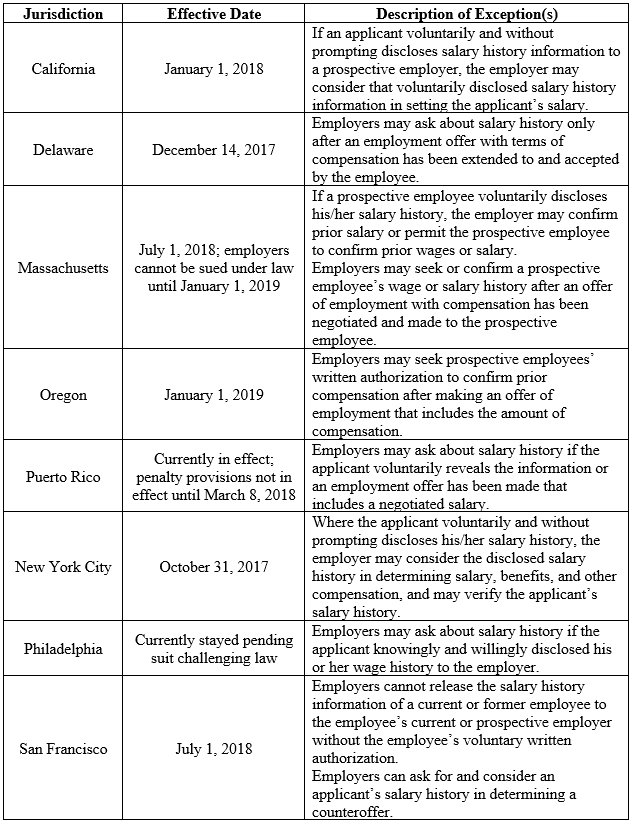The Ban’s Scope and Its Effect on M&A Deals
On October 9, 2017, the New York City Commission on Human Rights (the NYC CHR) posted a frequently asked questions page on its website to provide guidance on the law banning inquiry into applicants’ salary histories. The guidance clarified the geographic scope of the law. The law applies to employers of any size hiring job applicants in New York City, and “may apply” to employers who conduct interviews for employment in New York City. However, the law does not apply to New York City residents who are interviewed outside of the city and will work outside of the city. In addition, the guidance clarifies that employers cannot search public records about the employee’s salary history, or search the internet for information about the salaries paid to individuals with the job applicant’s specific title at the applicant’s current or former employer, confirming that under no circumstances should an employer be looking for, or considering, an applicant’s past salary history.
Importantly, the guidance clarifies how the law affects the exchange of employee salary information during a merger and acquisition transaction. When two parties consider the purchase and sale of a business, the target company will generally provide information about its employees’ salaries and other compensation arrangements as part of the acquiring company’s due diligence effort and its planning process for post-closing arrangements with the newly transferred employees. The exchange of employee salary information is often necessary so that the acquiring company can apprehend the economic reality of taking on the employees to be acquired, and in the event the acquiring company is unable to take on all its new employees, handle severance payments and potential Worker Adjustment and Retraining Notification Act or WARN Act obligations for laid-off employees.
The text of New York City’s salary history ban law failed to address how, if at all, employee compensation information could legally be exchanged during an M&A deal. The guidance has clarified that in acquisitions, employees of the target company are not considered job applicants. Therefore, companies can freely exchange employee salary information during due diligence and may rely on salary history information when acquiring all employees from the target company and making compensation and structural decisions on a non-individualized basis. However, if employees of the target company are asked to interview with the acquiring company, the salary history ban law could be implicated. Such interviews are often necessary when the transaction is structured as an asset purchase, as opposed to a stock purchase or merger where the employment relationships simply continue by operation of law. When interviews are required, the guidance recommends that any information about the employee’s salary information obtained during due diligence not be shared with the hiring managers responsible for making the hiring decision or decisions about the employee’s compensation.
Other Legislation Banning Inquiry into Applicants’ Salary History
New York City is just one of several jurisdictions around the country that have enacted legislation to prohibit employers from asking prospective employees and their current and former employers about applicants’ salary history, in an effort to combat compensation discrimination based on gender, race, and ethnicity. At least two other cities, four states, and Puerto Rico have also enacted similar laws. The laws are not identical, however, and the New York City guidance is not binding on other jurisdictions. As described below, the jurisdictions have adopted different exceptions to the salary history ban and different approaches to an applicant’s voluntary disclosure of his or her salary. Some also include additional related provisions; for example, California’s new law requires employers, “upon reasonable request,” to provide applicants the pay scale for the position the applicant is seeking.

It is expected that the trend of introducing laws to stop employer inquiries into applicants’ salary histories will continue around the nation. At least 18 states are considering similar salary history ban laws, including Illinois, Maryland, New Jersey, New York, Pennsylvania, Texas, Virginia, and Washington.
Employee Consent to Reveal Salary History
San Francisco’s ordinance is unique among the salary history ban laws as it is the only one that explicitly allows job applicants to provide written authorization to their past employers to disclose their salary history to their prospective employers. The NYC CHR’s guidance, however, clarifies that active job-seekers can provide their headhunters written authorization to disclose their salary history to prospective employers. Both the New York City and San Francisco local laws, however, prohibit employers from prompting any current, former, or prospective employees to provide such consent.
Next Steps
Employers across the country should pay particular attention to growing developments in this area of the law. As noted, other states are considering implementing similar laws banning employers from inquiring about or disclosing employee salary information. Employers should be mindful of these laws when drafting or implementing internal policies on employee hiring, interviewing and recruiting. Employers should keep in mind that they are not forbidden from asking prospective employees about their compensation expectations (as the NYC CHR’s guidance confirms); they simply cannot ask about the compensation they are currently receiving or received in the past.
States and cities with existing salary history ban laws likely will promulgate rules and regulations to supplement the current legislation, which could address their effect on mergers and acquisitions. In the meantime, businesses considering a sale or purchase of a business involving the transfer of employees within New York City should consider implementing the NYC CHR’s guidance. For deals, such as asset purchase transactions, that may require individualized interviews of the target company’s employees, the acquiring company should attempt to put in place firewalls to ensure that any salary information received during the due diligence process does not find its way into the hands of the managers who make the hiring decisions or determine employee compensation.
